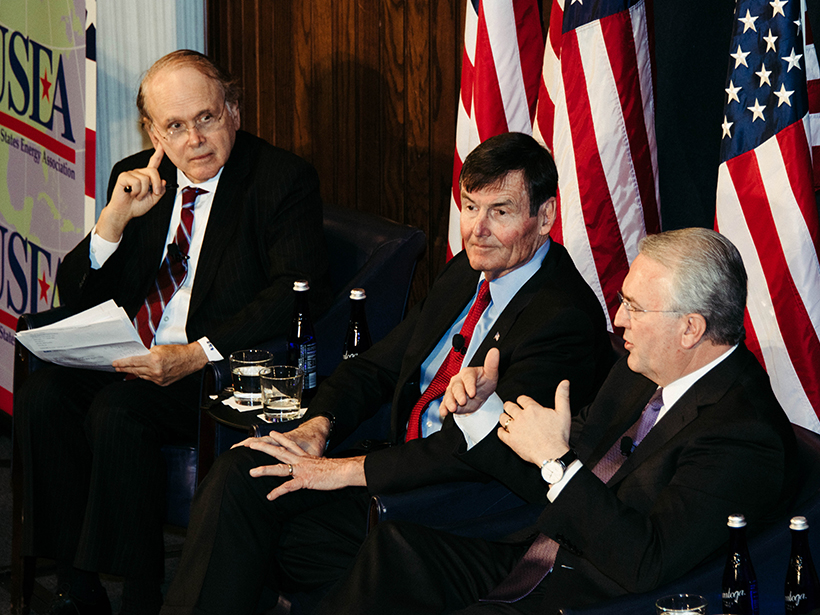“For the last 8 years, I’ve actually been sleeping like a baby,” Hal Quinn, president and CEO of the National Mining Association, quipped at an energy forum this week. “I was waking up every 3 hours crying,” he said.

Quinn and other energy industry leaders lamented their difficulties during the Obama administration at the Annual State of the Energy Industry Forum of the U.S. Energy Association in Washington, D. C., on Tuesday. They also spoke of hoped-for regulatory relief from President Donald Trump and weighed in on the future of the Paris climate agreement.
The Election as a Turning Point
“Did the election make a difference? That’s an understatement for my industry. Absolutely, yes,” said Quinn, who believes that mining has been hurt by federal regulations. Among those regulations, he said, are the U.S. Environmental Protection Agency’s mercury and air toxics standards (MATS) for power plants that Quinn said fall short in a cost-benefit analysis. Quinn also bemoaned the Clean Power Plan (CPP) to reduce carbon pollution from power plants, a moratorium on new coal leasing that he criticized as based on “contrived reasoning,” and regulations the Obama administration issued last December to prevent or minimize impacts to streams from coal mining debris.
Quinn hopes that Trump will “lift that regulatory anvil off the chest” of the mining industry “and allow us to compete in a free market.”
Quinn said he hopes that Trump will “lift that regulatory anvil off the chest” of the mining industry “and allow us to compete in a free market, something we really haven’t been able to do for at least the last 8 years.”
Trump and the Republican Congress can breathe new life into the mining industry, Quinn said, noting that Congress currently is moving forward with a measure to repeal the stream regulations. Quinn said that it could take a while to roll back the CPP, which he previously called “the biggest threat to the industry’s ability to rebound.” He added that Trump has expressed interest in taking a close look at the CPP, which currently is tied up in court.
Reductions in carbon dioxide emissions from the CPP would make “no discernible difference in climate change,” Quinn said. “If people are concerned about carbon dioxide, their shoulders should be behind getting the newest technologies for fossil fuels. Not just coal [but] for all fossil fuels.”
Support for “Smart Regulations”
Jack Gerard, president and CEO of the American Petroleum Institute (API), touted the United States as leading the world in carbon reductions, driven largely by natural gas consumption. He said that since 1990, natural gas production has dramatically increased while methane emissions have decreased by 15%.
Gerard blasted the Obama administration for methane regulations that he said have cost his industry about $800 million annually. He added that 94% of the outer continental shelf is now off-limits for oil and gas development and criticized regulations by the Obama administration that he said had barred much of that restricted area from development. He also criticized the Obama administration for changing the rules to approve pipelines. “We’ve got to restore the rule of law in the United States,” he said, adding that the government needs to honor the permitting process that it created.
“It’s not a question of rolling regulations back, as others have alluded to. It’s a function of how you [regulate] appropriately.”
In an interview with Eos, Gerard said that there is an appropriate place for smart regulation. “It’s not a question of rolling regulations back, as others have alluded to,” he said. “It’s a function of how you [regulate] appropriately, with the right amount of regulation that has the best benefit to the American people.”
Paris Climate Agreement
Several forum speakers discussed pluses and minuses of the landmark Paris climate agreement and how the Trump administration might handle it.
Tom Kuhn, president of the Edison Electric Institute, a Washington, D. C.–based association representing U.S. investor-owned electric companies, said the agreement likely is not at the top of Trump’s agenda and that the new administration might take some time examining it. “What you have to take into account when you look at [international agreements] is the impact on your trading partners,” Kuhn said. He added that some people in other countries are jealous of the United States’ natural gas boom and would like to have access to some of it.
Mining association leader Quinn told Eos that he thinks the Trump administration will assess how the Paris agreement aligns with its agenda and determine whether there is a “fit with how they want to bring the United States forward economically on energy and other things.”
—Randy Showstack (@RandyShowstack), Staff Writer
Citation:
Showstack, R. (2017), Fossil fuel leaders look to new playing field under Trump, Eos, 98, https://doi.org/10.1029/2017EO067269. Published on 03 February 2017.
Text © 2017. The authors. CC BY-NC-ND 3.0
Except where otherwise noted, images are subject to copyright. Any reuse without express permission from the copyright owner is prohibited.

